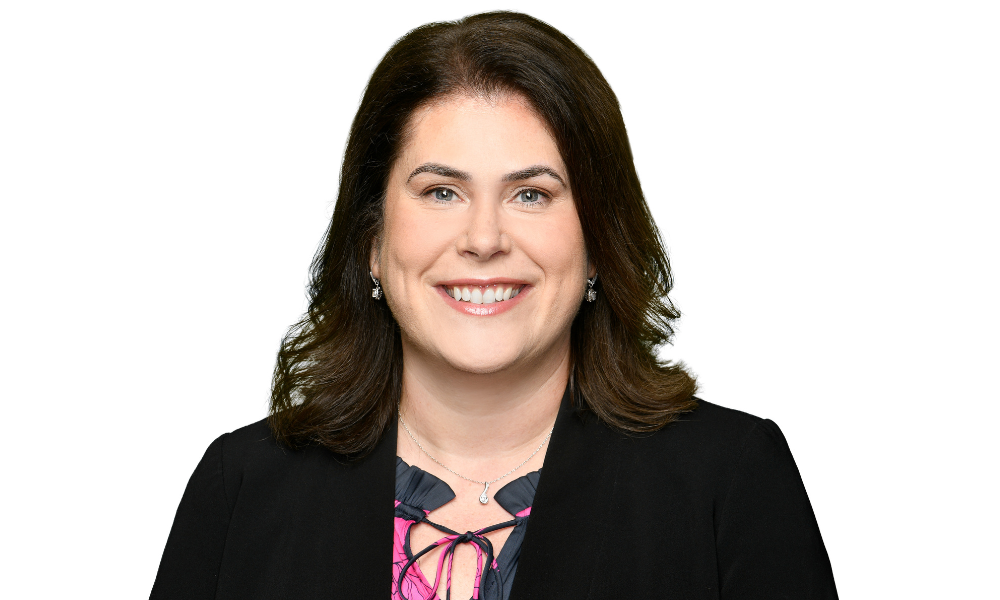The Top 25 Most Influential Lawyer applied a gender lens to her Mass Casualty Commission work

For Michelle Kelly, achieving balance is not about separating work and personal passions. Instead, she advises young lawyers to merge them.
“I've been a die-hard feminist from the hop, and then all things [equity, diversity and inclusion] became a real passion for me, and I was able to leverage that into my career. So instead of keeping them separate and distinct, integrate your outside passions into your inside legal career because that is how you're going to achieve that balance.”
Kelly’s passion for EDI is grounded in her personal life. She developed an interest in feminism as a law student at the University of New Brunswick, but it was not until she started a family that her commitment to diversity became personal.
She married a Black man who grew up in Jamaica, and when they had a child together, “We both looked at each other and said, ‘We are not equipped to raise this lovely biracial girl in Canada,’ since neither of us have ever grown up in Canada being racialized.”
Kelly’s commitment to her daughter’s well-being meant a commitment to EDI. “Being both a young girl and a racialized young girl, I want to make sure the world is a better place for her.” So, Kelly brought this passion to her workplace as a litigator in the Halifax office of Cox & Palmer.
She joined the firm after articling there and quickly gravitated to litigation’s human side. “It's always been about the humanity and seeing how people react in different forums.” People would take rigid stances initially, but “as soon as they walk into the formality of the courtroom, everything changes, and everyone leaves themselves bare.”
Kelly eventually became the firm’s first EDI partner and worked on many EDI-related initiatives outside her firm. She is currently the chair of the gender equity committee for the Nova Scotia Barristers Society, which surveyed members in 2018. “Hearing the words that people wrote of a confidential nature about their experiences in the profession of law in Nova Scotia over the last 10 years was just truly eye-opening and shocking.”
She says the committee realized that these issues would not solve themselves and that it would have to “put tangible resources behind helping and fixing this ridiculous problem that our profession still faces.” In September 2022, the committee, in conjunction with the Federation of Law Societies, released a report on gender-based discrimination and harassment in the profession in Nova Scotia.
“We really lobbied to expand the scope of what conduct would be covered,” Kelly says, which included behaviour outside of the practice of law “regardless of whether you're at a bar or on the street with your buddies.” The changes to the code of conduct were implemented in Nova Scotia in January 2023.
In her practice, Kelly also became fascinated with how technology is used in litigation. So, when the province announced a public inquiry into the mass casualty in Nova Scotia, she knew it was the perfect opportunity to merge her interests in litigation and feminism.
Cox & Palmer had already worked on public inquiries, and the firm’s director of information technology had invested in the technology needed to manage many documents.
“I marched myself in there and said, you have to put me on this, and you have to put me on it quickly.”
So, Kelly served as lead counsel for document management at the Mass Casualty Commission, the first virtually paperless commission in Canadian history. The work involved 100,000 documents and a final report of over 3,000 pages.
Kelly noticed that past inquiries had not applied a gender lens even though the victims were often women. “It was very important for me to make sure that the Mass Casualty Commission, which we lived through as Nova Scotians, applied that gender lens. And they did right from the get-go.”
Kelly was paired with a homicide investigator, and her job was to apply a trauma-informed lens to the documentation. That meant “sanitizing” the documents so they could be made public.
“This was a very large mass casualty with a number of crime scenes. And we wanted to make sure that we weren't being insensitive to the public and putting out information that was going to re-traumatize or traumatize anyone.”
Kelly is equally committed to advancing EDI at her firm as she is in her community. In 2022, she became Cox & Palmer's regional EDI committee co-chair, reporting directly to the board. The committee’s work has resulted in equity-lens training for its leadership team and re-evaluating the firm’s partnership admission criteria, origination credits system and parental leave policy.
“Three years ago, we were a very white, predominantly male firm, and things have changed dramatically for the better,” she says. “It's not about softening targets for people; it's about breaking down barriers to make those targets achievable for all.”
Breaking down barriers that one day, perhaps, will help her daughter succeed.
Michelle Kelly is one of 2023’s Top 25 Most Influential Lawyers.










